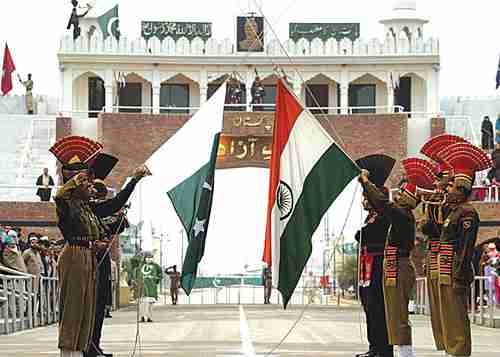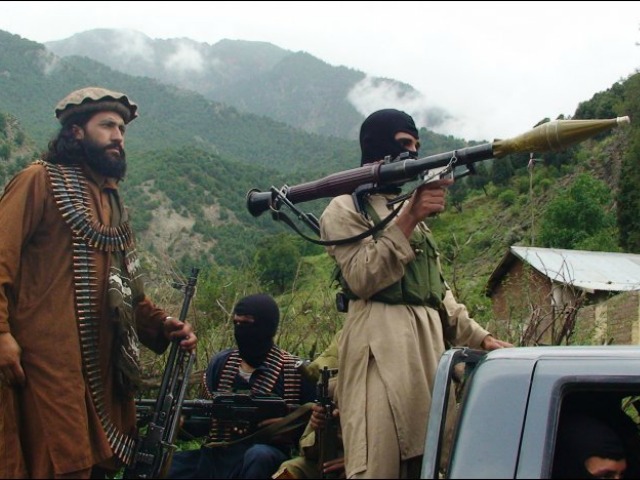
This morning’s key headlines from GenerationalDynamics.com
- Multiple Taliban groups claim credit for suicide bombing in Pakistan
- Abu Nimr tribes blames Iraq government for massacre by ISIS
- Journalist finds young Iranians very friendly to America
Multiple Taliban groups claim credit for suicide bombing in Pakistan

Flag-lowering ceremony at the Wagah border crossing between India and Pakistan
At least 45 people were killed and over 120 injured on Sunday when asuicide bomber blew himself up at the Wagah Pakistan border crossingto India, near Lahore. The suicide bomber walked past four checkposts. When he was finally stopped at a check post, he blew himselfup. Some reports indicate that a gas cylinder exploded.
Wagah is the only border crossing between India and Pakistan. Thecrossing closes every day at sundown, at which time there’s a verycolorful flag-lowering ceremony in which both Indian and Pakistanirangers participate. Hundreds of people, including families withwomen and children, gather on both sides of the border to see thedisplay of military pageantry. The suicide bomb was timed to explodewhen crowds of people on the Pakistan side were leaving the ceremony,heading for the parking lot. No Indians were injured.
The Pakistani Taliban (Tehrik-e-Taliban – TTP) has been an umbrellaorganization for numerous terror groups in Pakistan. As we’vereported many times, the TTP has been disintegrating, as a number ofgroups have declared independence, and some have even desertedal-Qaeda and instead declared allegiance to the Islamic State of Iraqand Syria (IS or ISIS or ISIL). (“6-Oct-14 World View — ISIS influence spreads in Asia, as Pakistan Taliban pledges support”)
The disintegration was on display on Sunday, as three differentgroups claimed responsibility for the Wagah bombing. OneTTP faction said they carried it out to avenge the killingof a Taliban leader in a U.S. drone strike last year.
The Jamat-ul-Ahrar faction, which broke away from the main TTPleadership in September, said THEY were responsible, toavenge the ongoing Pakistan army military action againstthe Taliban on the border with Afghanistan at the oppositeend of Pakistan from Lahore. A third militant faction,Jundullah, has also claimed credit.
There is certain to be a major political backlash because of Sunday’sbombing. According to reports, intelligence sources had interceptedintelligence about a possible attack at the Wagah border crossing, andthey had issued an alert on Saturday to Wagah border authorities.Security at the Wagah border had been increased, but that was notenough to avert the attack. The News (Pakistan) and Samaa TV (Pakistan)
Abu Nimr tribes blames Iraq government for massacre by ISIS
As we reported yesterday, theIslamic State has beenspecially targeting the Abu Nimr tribe, one of the few Sunni tribesthat have been actively fighting against ISIS as it approachesBaghdad. Mass killings have killed 322 members of Abu Nimr. Morethan 50 bodies were found in a water well, while 65 members have beenkidnapped, and are being held as hostages. The latest attack occurredon Sunday morning, when at least 50 were killed.
Now Abu Nimr leaders are claiming that the Shia government in Baghdadencouraged them to fight ISIS, promised them weapons that never came,and then left them to be massacred. They are claiming that theyprovided coordinates for U.S. air strikes, but they were ignored.
This experience may affect the American strategy. The plannedstrategy of the Obama administration is to repeat the success of theBush administration “surge,” when the army got cooperation from Sunnitribes, including Abu Nimr, to fight al-Qaeda in Iraq. ISIS will usethe Abu Nimr massacre to convince other Sunni tribes not to attempt tocooperate with either Baghdad or the U.S. BBC
Journalist finds young Iranians very friendly to America
CNN correspondent Anthony Bourdain recently returned froma trip to Iran, and described his experiences on theFareed Zakaria show on CNN:
Yeah, and an incredible experience. What we sawinside Iran was extraordinary, heartbreaking, confusing,inspiring, and very, very different than the Iran I expected fromalways – you know, from looking at it from afar, from ageopolitical sense, what we read on the news, what we know fromthat long and very contentious relationship we’ve had as nations.
[The most surprising thing was to] walk down the street as anAmerican and have total strangers constantly saying where are youfrom? America? You know, have you tried our food? Thank you forcoming. I’m so — just outgoing, friendly, welcoming to strangersto a degree that we really experience very, very few places andI’m talking Western Europe and allied nations. We were really -we’d been told to expect that, but you’re thrown by it when youface it everywhere. Our producer was — it was his birthday and weall went out with our local crew to a very crowded restaurant,traditional Persian music and Iranian families eating and someonefound out that my producer — it was his birthday, the entirerestaurant sang “Happy Birthday” to him and they presented himwith a cake. It was a very different Iran than I had been led toexpect or could have imagined.
[You] see how careful people are, of course, and they are verycognizant that the — what’s OK right now might not be OK in fiveminutes as far as behavior. But it feels a lot like Barcelona fora few minutes at a time, and we went at one point — hung out in aparking lot in Tehran late at night with all these young Iraniankids who collect American muscle cars and basically hang out andorder up pizza and rev their engines and collect, you know,mustangs and challengers, and for a minute you can be forgiven forthinking it’s southern California. The kids like any other – It’sa very young country, of course. So the disconnect between thehard- liners and the people who run and control the country andthe Iran you see and feel on the street is very jarring and Ithink people are – it’s just going to blow people’s minds whenthey see it.
Reading this, you can see the reason why I’ve been saying for tenyears that Iran was going to become our ally. It actually began to beobvious in the early 2000s, when college students began havingpro-American demonstrations.
Iran is in a generational Awakening era, just one generation past the1979 Great Islamic Revolution and the Iran/Iraq war that climaxed in1988. The generation of children that grew up after the war arerebelling against their parents, just as American children rebelledagainst their parents in the 1960s. Iran is having a “generationgap,” just as America had a generation gap splitting the survivors ofWorld War II from their children, the Boomers who grew up after thewar.
Iran’s hardliners are the survivors of the Great Islamic Revolution.As each year passes, there are fewer of them, and more of the youngergeneration, which likes the West, and has nothing in particularagainst Israel.
As I’ve reported many times ( “10-Jun-14 World View — Iran’s Supreme Leader complains young people are not revolutionary enough”), the attitudes of youngpeople are causing panic among the old geezer hardliners. They knowthat the hardline Islamic revolution will not survive in anything likeits present form when they’re gone. CNN
KEYS: Generational Dynamics, Pakistan, Lahore, Wagah, India,Tehrik-e-Taliban, TTP, Pakistan Taliban, Jamat-ul-Ahrar, Jundullah,Islamic State / of Iraq and Syria/Sham/the Levant, IS, ISIS, ISIL,Iraq, Abu Nimr, Baghdad, Iran, Anthony Bourdain
Permanent web link to this article
Receive daily World View columns by e-mail

COMMENTS
Please let us know if you're having issues with commenting.